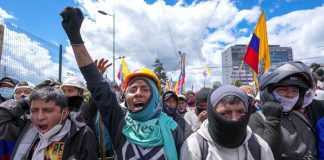Recently Ignatius Mahendra Kusumawardhana, the International relations officer of the Indonesian socialist group PRP (Working People’s Association) visited Australia. Mahendra was involved in the demonstrations that brought down Indonesian dictator Suharto in 1998, and was imprisoned for two years under President Megawati from 2003. He spoke with Solidarity
How has the economic crisis since 2008 affected workers and the poor in Indonesia?
Neo-liberal economic [policies in Indonesia mean] privatisation, removal of subsidies, free trade, labour market flexibility and liberalisation of investment regulations. For workers and poor people that means rising prices of basic needs, low wages, factory closures, lay offs and casualisation.
Since the economic crisis in 2008, conditions are getting worse. Statistics [show] lay offs of around 7.5 million people in 2009. This adds to the 40 million people already unemployed. Shortly before the implementation of the Free Trade Agreement between China and ASEAN in late 2009, 271 factories closed because they could not compete with foreign imports. This caused 18,396 workers [to be sacked]. Seventy per cent of the 110 million-strong work force in Indonesia [work under] outsourcing, [short-term] contracts or in the informal sector. Around 100 million people live under poverty and 32.5 million of them in extreme poverty.
To what extent has the corruption and influence of the military on politics that were a feature of Suharto’s New Order been cleaned up?
Corruption in Indonesia has never been cleaned up by the government. From President Habibie until current President SBY (Susilo Bambang Yudhoyono), corruption cases brought to court have mainly been small corruption cases or [cases targeting] the non ruling party. None of the governments since Suharto have investigated corruption by Suharto and his family.
SBY’s government bailed out the Century Bank with the total of 6.7 trillion rupiah in 2008 [reportedly to save the investments of SBY allies in the bank].
Although formally the government says that the military’s dual function has been erased, the military still maintain their influence from national to village level through their territorial structure [where the military maintains units locally in every province across the country].
By law the Indonesian military still can intervene in politics through reasons like “national security”. SBY’s government recently appointed Sjafrie Sjamsoeddin as Vice Defense Minister. This is actually against Indonesia law that states active military personnel cannot have a civilian position.
What sort of socialist organisation is the PRP?
The PRP was based on left unification, we [contain activists from] different perspectives. [We wanted to provide] space to have discussion—and maintain unity in action inside the organisation.
But all of us agreed on several key things. In 1998 we managed to overthrow the military regime and [there was] a boom of [interest in] left literature [like the writings of] Marx and Lenin. But the left was unable to use that momentum to build a mass organisation. Bourgeois ideas gained hegemony amongst the workers. There is a need to challenge [that] by building a mass left organisation. Also [we agreed on] the need for a working class party, and working class leadership in the organisation.
Now PRP has around 250-300 members, most of them committed full-time activists. We also have hundreds of candidate members. They must go through a trial process for a couple of months before becoming a full member.
Why did the PRP develop a focus on organising amongst Indonesian workers as opposed to the urban poor?
[When the PRP was formed in 2004] one of the main [conclusions] was that a socialist organisation with the perspective of building a working class party must have a working class mass base. Previously other left organisations [talked] about the need for a working class party but never really built up working class support. Indonesia is not an agrarian country any more. Its peasant composition is getting smaller and smaller. There is the growth of a working class, in [short-term] contract work and outsourcing. The only class that has the revolutionary potential to overthrow capitalism is the working class.
Shortly after 1998 there were hundreds if not thousands of new trade unions founded. There have been lots of efforts to unite all of the trade unions. One of the successful attempts is KASBI (Confederation Congress of Indonesia Union Alliance). Now KASBI is the biggest alternative and progressive trade union in Indonesia. KASBI has 128,000 members.
We are trying to build as much space for consolidation with the rest of the left in Indonesia as possible.





